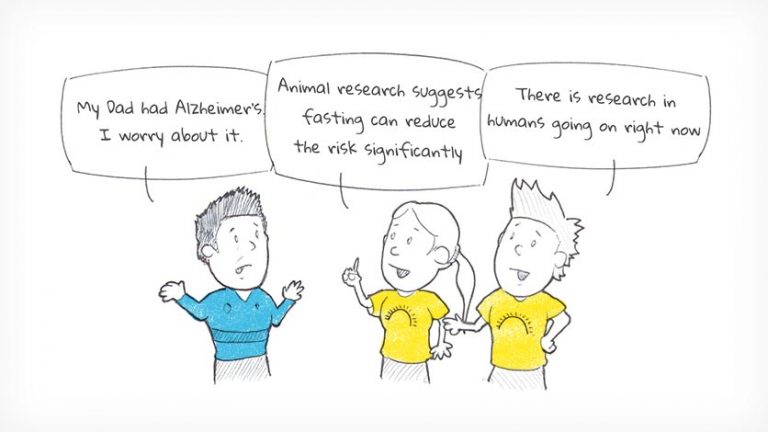In recent years, Alzheimer’s disease and other age-related brain disorders have become important causes of disability and death. Interestingly, many of the risk factors for cardiovascular disease, type 2 diabetes and cancers, are also risk factors for age-related brain diseases. Indeed, some experts have described Alzheimer’s disease as “type 3 diabetes”. These risk factors include a high calorie diet and a sedentary life-style.
During fasting the body produces several chemicals that improve brain and nerve health by protecting nerves from damage and promoting repair and regrowth of damaged nerves.1,2 Studies in animals have suggested that intermittent fasting may help prevent or improve several neurological conditions, including:
- Alzheimer’s disease1,2
- Parkinson’s disease1,2
- Huntingdon’s disease1
- epilepsy2
- stroke.2
The effects of intermittent fasting on the brain
Animal studies
Studies on animals have shown that intermittent fasting can protect the brain and nerves from damage induced by high blood glucose or environmental toxins. Fasting can induce production of chemicals (such as brain derived neurotrophic factor or BDNF) that encourage the growth of new nerves, and reduce inflammatory molecules associated with Alzheimer’s disease. Fasting also shifts the brain to using increased amounts of ketones for fuel; this is known to promote nerve repair, reduce the probability of seizures, and increase the activity of genes associated with longevity.1,2
As with many of the other health benefits of fasting, the lowering of insulin and of blood sugar which occurs during fasting is particularly important. Older people who have higher blood glucose levels (even when these are within the normal range) have been shown to suffer from poorer memory than those whose blood sugar levels are lower.3
In mice, increasing the time between meals even without reducing the total calorie intake has been found to have beneficial effects on the brain, demonstrating that it is the fasting itself not simply the reduction in calories that brings the benefit.4
Human studies
Much of the work on the effects of intermittent fasting on the brain of animals has been done by Dr Mark Mattson, who has recently started some studies in humans. Dr Mattson is starting a study to measure how fasting twice a week for two months affects human brain function and early signs of Alzheimer’s. He plans to have women between the ages of 55 and 70 who are obese and have insulin resistance but are not yet diabetic. The women will have a battery of tests including brain scans and blood tests for BDNF before and after two months of following 5:2 intermittent fasting.
A very preliminary study of the effects of alternate day fasting on cognitive function was reported by Dr William Donahoo and Dr Mattson at a scientific conference on obesity in 2013. In this study, patients who fasted completely every other day lost about the same amount of weight over 2 months as those who didn’t fast at all. But at 6 months, after patients were technically off the intervention, those who had been in the fasting group had greater weight loss and greater improvements in cognitive function than those on a standard diet.5
Test your own cognitive function!
FIXME: include an image from the cognitive function test mentioned below?
Whether you are worried about your mental functioning or just would like to see whether intermittent fasting changes your brain power, if you are aged between 50 and 70 years, you can test yourself using this online cognitive function test. Test yourself now and then again after a few weeks of fasting.
We’d be very interested in how you get on, so please let us know in the comments section below or join our FastDay Forum and start a conversation.











